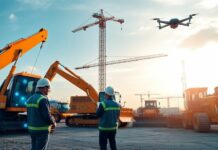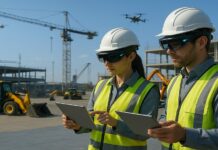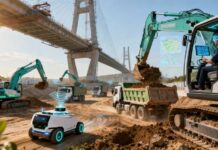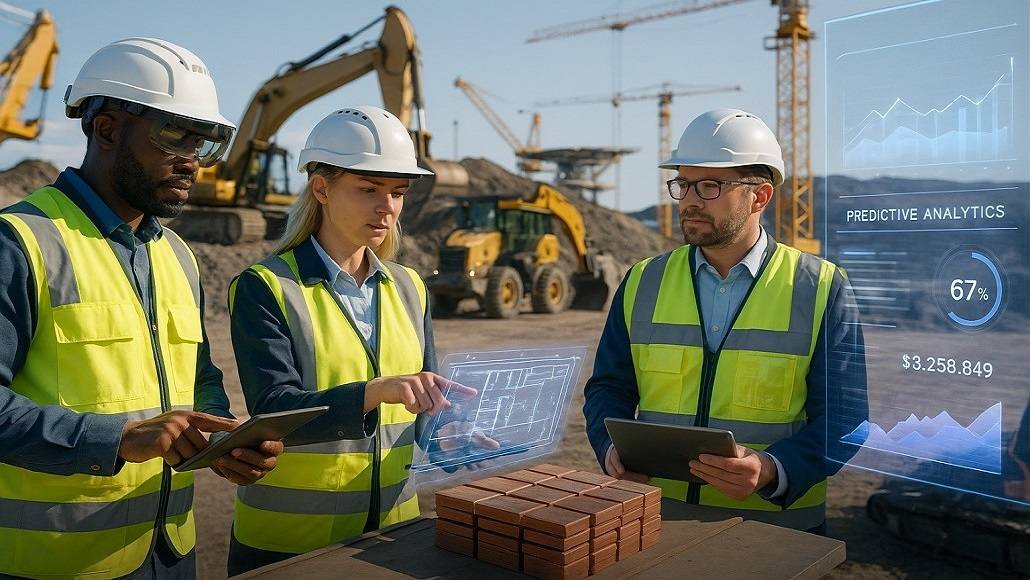The construction industry, particularly civil construction, has long been characterized by its complexity, high risk, and the need for meticulous planning and execution. For many years, engineers and project managers have relied upon traditional practice that relies heavily on experience, manual calculations, and static plans. As new technologies emerge, particularly artificial intelligence (AI), the landscape of decision-making and project resilience in the construction industry is being transformed.
AI is not just automation, but incorporates predictive knowledge, real-time assessment, and adaptation into a decision-making framework. These innovations give construction projects resilience to unanticipated obstacles, lower costs and delivery times without sacrificing safety or quality. The construction industry is beginning to embrace AI-derived solutions, where the wise use of human judgement in conjunction with AI systems is building a new era of intelligent, efficient, and sustainable construction practices.
-
Artificial Intelligence Revolutionising Civil Construction
Artificial intelligence is transforming the civil construction industry at every level. Whether it is data or information, AI’s ability to analyze data in real time and uniform dimensions has enhanced the ability to plan, assess operational risks, and operate more efficiently. AI-powered predictive analytics enable project teams to anticipate potential delays, budget overruns, and safety risks well in advance.
One of the most impactful applications of AI is in project planning and scheduling. Machine learning can optimize construction schedules dynamically by using historical project data, environmental factors, and resource availability. This assists in minimizing idle time, reducing delays, and enhancing resource management. For example, AI systems can optimize schedules automatically when there are unforeseen weather conditions or supply chain disruptions, keeping projects on schedule.
Another substantial domain where AI is impacting positively is safety management. With the use of AI-fitted sensors and cameras, construction sites are getting safer with round-the-clock monitoring of work sites. AI systems are able to identify dangerous habits or situations, including employees not using protective equipment or equipment running above permissible limits, and inform supervisors immediately. This preventive safety management minimizes accidents and enhances site resilience overall.
AI further improves quality control by using computer vision technology that examines materials, construction structures, and work progress. The technology can detect faults or inconsistencies with design specifications at high accuracy, reducing rework and adherence to standards. AI is not only ensuring projects are done more efficiently but is also enhancing the quality and sustainability of projects.
Additionally, simulations and digital twins (virtual replicas of physical assets) based on AI can support project teams in modelling several approaches and options before they are acted on. These simulations can provide insight on how different variables could affect the project, allowing teams to make better decisions and build greater resilience towards uncertainty.
-
The Collaboration of Human Expertise and AI: Enhancing Construction Decision-Making
Although AI can provide significant value, it is neither a substitute for human expertise nor a solution. Rather, AI should be seen as an augmentative tool to support capable practitioners. The combination of human expertise and AI analytics has partnered to provide a dynamic system with improved decision-making that is both more accurate, more informed, and more flexible.
In practice, experienced engineers and project managers contextualize the main insights derived from AI with information specific to the site and regulatory requirements, as well as stakeholder issues. The interactive approach ensures that information-based advice is relevant, and into account the ethical responsibilities that surround project data. For example, AI might recommend an approach to minimize cost with its timeline. However, a practitioner may need to use their experience to address community consultation or environmental issues.
Additionally, AI drives collaborative decision-making through real-time dashboards and predictive reports accessible to many stakeholders. This transparency fosters a shared understanding of project status, risks, and opportunities, and facilitates agile, collaborative reactions to risk and threats as they arise.
Training and upskilling are key elements of building this collaboration. Construction professionals must understand AI’s capabilities and limitations so they can harness its full potential in an appropriate way. As AI technology continues to advance and becomes more intuitive, we are observing a cultural shift towards data literacy and technological skills in the industry, ultimately helping workers make better decisions and respond more effectively to changes in project conditions.
Ethical considerations surrounding the use of AI, such as data privacy, fairness and accountability are also critical for establishing trust and ensuring that it is used responsibly. Human oversight is still important to mitigate these risks and protect the integrity of the decision-making process.
-
Enhancing Efficiency, Sustainability, and Resilience in Civil Construction
The integration of AI in civil construction is resulting in great improvements in efficiency and productivity. Project management software can understand real time activities, identify delays and suggest corrective actions all in real time. This helps eliminate wasted time, pointless delays and reduce the overall project delivery duration.
For example, equipment predictive maintenance via AI eliminates equipment failures with scheduling of maintenance before equipment failure. This proactive strategy provides maximum equipment uptime and minimum delay time from wasting time and resources. Similarly, logistics systems that use AI optimize material delivery routes to help save fuel and also lessen carbon footprints.
Sustainability is another major benefit of AI in construction. By interpreting environmental data, AI models can help project design for reducing ecological footprints, from selecting sustainable materials to estimating energy use during both the construction and operational phases of projects and facilitate eco-friendly decisions.
AI also supports adaptive project management: the type of bona fide project management that adapts to changing conditions and does not compromise safety or quality. For example, when things don’t go according to plan (severe weather, supply chain issues), AI algorithms can offer alternate plans of action that can protect overall project schedule and budget, while maintaining resilience.
The role of digital twins and virtual simulations also support sustainability, by allowing testing and optimization of designs virtually without the use of materials or needing physical prototypes. Moving forward, as AI technology continues to harness its full potential, this will become even more important as we look to deliver sustainable, efficient, and resilient civil construction projects.
-
Risk Management and Safety Enhancement
Apart from scheduling and resource optimization, AI greatly enhances risk management and safety measures on the building site. Traditional risk analysis relies heavily on past history and human judgement, which is beneficial, however, there are limitations because this past history is often narrow and reactive. On the other hand, AI utilizes live data input streams from sensors, drones, and IoT sensors to predict and recognize threats prior to accidents occurring.
For instance, computer vision-based systems with AI can interpret environmental data (wind speed, humidity, and structural fatigue) to predict potential weather-risk or structural failure. Drones with AI-vision systems scan construction sites real-time, identifying hazardous activities or conditions, including instability of scaffolds or unauthorized site access. This real-time hazard identification allows site management to initiate immediate corrective measures, hence minimizing accidents and maintaining project resilience.
-
Cost Optimization and Financial Resilience
Construction projects are often plagued by cost overruns due to unforeseen delays, material wastage, or inefficient resource management. Financial planning and cost control are being revolutionized by AI applications, resulting in precise budgeting and enhanced financial stability.
Machine learning algorithms process past cost information, market data, and supplier behavior to produce accurate cost estimates. Throughout project delivery, AI systematically tracks costs, compares actual data with projections, and forecasts likely budget overruns. This allows project managers to act quickly on corrective measures, preventing costly setbacks.
Additionally, AI optimizes procurement operations by forecasting material demand, determining the cheapest suppliers, and planning deliveries so that storage expenses and wastage are lessened. With AI-powered financial management technologies integrated, civil construction companies make themselves more resilient to economic variations and uncertainties associated with individual projects, guaranteeing long-term profitability and stability.
-
Enhancing Collaboration and Stakeholder Engagement
Communication and collaboration among project stakeholders—contractors, clients, suppliers, and regulators—are crucial to project success. AI enhances communication and collaboration through sophisticated data sharing platforms, natural language processing (NLP), and virtual assistants that provide clear and timely structure for sharing information.
AI-based project dashboards will provide stakeholders, irrespective of their physical locations, timely feedback regarding project progress, risk, and resource consumption. Further, AI can ingest and summarize large datasets, and then use NLP to create concise, clear, and straightforward reports to help facilitate comprehension and prompt action.
In addition, AI-driven chatbots and virtual assistants respond to questions, schedule meetings, and make announcements, minimizing administrative tasks and keeping stakeholders engaged and informed.
-
Post-Construction Lifecycle Management and Maintenance
The impact of AI also goes beyond project delivery into the operational phase of infrastructure. AI-based predictive maintenance models break down sensor data from bridges, buildings, or roads to predict structural problems way ahead of time before they become failures.
This predictive management greatly minimizes downtime, repair expense, and safety risk, thus enhancing the resilience of infrastructure assets. AI also helps improve energy efficiency and environmental performance using intelligent building systems, and drives sustainability objectives.
Digital twins, which are virtual reserves of physical assets, also allow for monitoring and simulation of post-construction performance under changing conditions continuously. These systems allow for data-driven decisions regarding repairs, upgrades, or replacement, assuring longevity and efficiency of operation.
Conclusion
The integration of artificial intelligence into civil construction represents a turning point in the direction of intelligent, more robust, and sustainable projects. With AI in decision- making, it is possible to analyze intricate information, forecast results, and streamline processes, at every phase of construction, from planning and design to execution and upkeep.
More significantly, AI in decision-making does not replace human intellect; it enhances it. The best projects are projects undertaken with experienced experts taking advantage of the AI to make better, faster, and more informed decisions while integrating local, ethical, and environmental factors. The goal should be a seamless integration between human intelligence and machine learning to define the future of construction projects that become safer, more efficient, and more resistant to disruption.

































